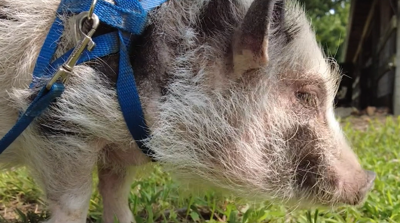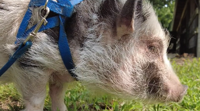DOVER, Del. - More than 40 Delaware owners of potbellied pigs have applied for an invasive animal permit since the Delaware Department of Agriculture announced a new regulation last week that lists these animals and wild pigs of any kind as invasive. These include teacup pigs, pocket pigs, pygmy pigs, and other types of pig crosses.
One of the main concerns for owners is the visible identification ear tag their animals must have to comply with new regulations. Because of this, the department said Friday that owners will not be in violation if they choose to microchip their animal.
"We know for many owners, these pigs are their pets, many living in their homes like a dog or cat would, so the thought of an ear tag used for pigs on a farm is hard to handle," said state veterinarian Dr. Karen Lopez. "Based upon the feedback, we are providing the option for owners to have their pigs microchipped by their licensed veterinarian."
Lopez went on to say that, if the pigs are not microchipped yet, owners must call their vet immediately to get on the schedule. An appointment must be scheduled before their on-site premise inspection and the licensed vet must provide the owner with a copy of the universal microchip number and proof that they microchipped the animal. This information should then be submitted to the Delaware Department of Agriculture Poultry and Animal Health staff at the on-site inspection.
During inspection, pig owners will be given a liability waiver to sign that affirms they understand that invasive species that are microchipped are at a greater risk of being euthanized if owners do not report their escape within 12 hours. Owners who do report will have 72 hours to assist the department in recapturing their animal.
The department reiterated that it is making this regulatory change to address a growing problem involving a new wild pig population in the state. Since there are no natural predators for these pigs in Delaware, the department says they become a nuisance for private property owners in residential and rural areas.
"There are people out there who are accusing us of wanting just to kill these pigs, which is not the goal of this regulation. We now have a feral swine population of about 300 pigs, which stemmed from the abandonment and escape of potbellied pigs and potbellied-cross pigs," said Lopez. "By having a permit process for these invasive animals, we want owners to take the initiative to ensure their pigs have proper housing and secure fencing so they can't escape, that they spay and neuter their animals so we can stop unwanted litters and behavioral problems and that if they escape, the owner reports it to us so we can work with them to recapture their animals."







